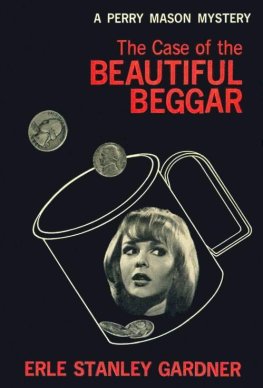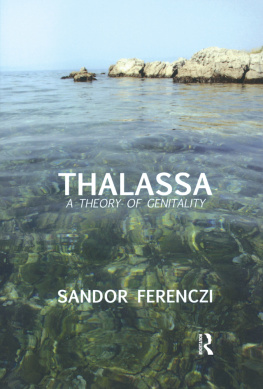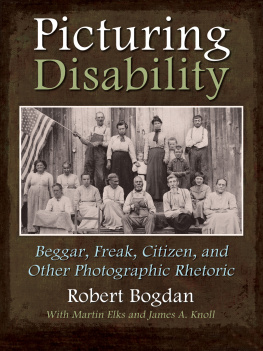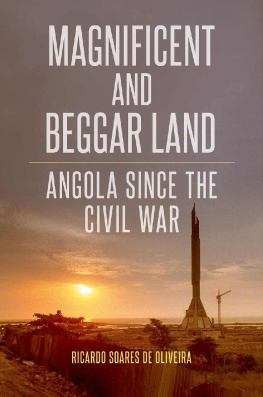Thalassa Ali - A Beggar at the Gate
Here you can read online Thalassa Ali - A Beggar at the Gate full text of the book (entire story) in english for free. Download pdf and epub, get meaning, cover and reviews about this ebook. year: 2004, publisher: Bantam Books, Random house, Inc., genre: Art. Description of the work, (preface) as well as reviews are available. Best literature library LitArk.com created for fans of good reading and offers a wide selection of genres:
Romance novel
Science fiction
Adventure
Detective
Science
History
Home and family
Prose
Art
Politics
Computer
Non-fiction
Religion
Business
Children
Humor
Choose a favorite category and find really read worthwhile books. Enjoy immersion in the world of imagination, feel the emotions of the characters or learn something new for yourself, make an fascinating discovery.

- Book:A Beggar at the Gate
- Author:
- Publisher:Bantam Books, Random house, Inc.
- Genre:
- Year:2004
- Rating:3 / 5
- Favourites:Add to favourites
- Your mark:
- 60
- 1
- 2
- 3
- 4
- 5
A Beggar at the Gate : summary, description and annotation
We offer to read an annotation, description, summary or preface (depends on what the author of the book "A Beggar at the Gate " wrote himself). If you haven't found the necessary information about the book — write in the comments, we will try to find it.
A Beggar at the Gate — read online for free the complete book (whole text) full work
Below is the text of the book, divided by pages. System saving the place of the last page read, allows you to conveniently read the book "A Beggar at the Gate " online for free, without having to search again every time where you left off. Put a bookmark, and you can go to the page where you finished reading at any time.
Font size:
Interval:
Bookmark:
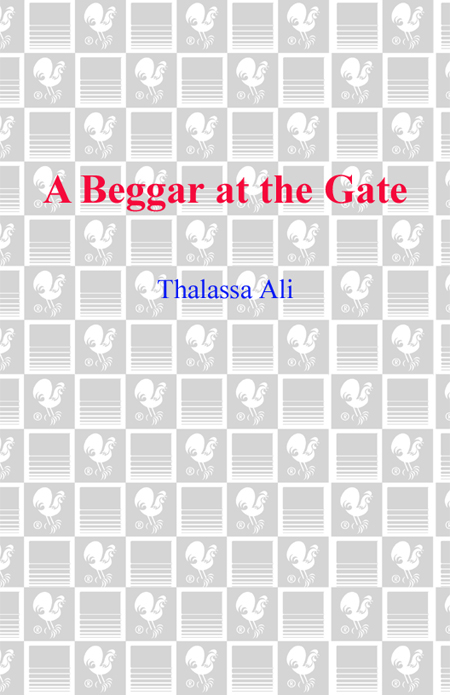

A sweeping pageant of life in the British Raj, and one woman's attempt to realize her destiny. Mystical and romantic in a way that recalls The Far Pavilions.
Stephanie Barron
An excellent book, beautifully researched and charmingly written, which does justice to both English and Indian cultures. I was particularly impressed by the matter-of-fact mysticism and spirituality. Lovely.
Barbara Hambly
A rare book indeed. It combines extraordinary characters, a riveting plot, a rich historical backdrop, Sufi mysticism, and the allure of an exotic oriental court, and is eminently readable. The reader will be tempted to devour it in one reading. OutstandingWe breathlessly await the sequel.
She Magazine
[A] distinctive setting [and an] intriguing first novel.
Washington Post
This mesmerizing tale helps readers better understand a vitally important area of the world.
School Library Journal
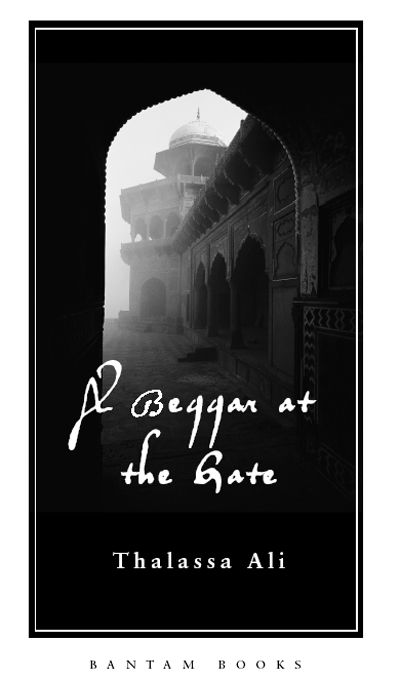
To the memory of my English mother,
Thalassa Cruso Hencken
and
my American father, Hugh ONeill Hencken
The great Arthur Edelstein, who died in the summer of 2003, taught me the craft of fiction. Thank you, Art.
I would also like to thank my hardworking agent, Jill Kneerim at Kneerim and Williams; my extraordinary editor at Bantam, Kate Miciak; Caitlin Alexander; and peerless Bantam managing editor, Kathleen Baldonado.
I would also like to acknowledge the help and kindness of my writing group: Lakshmi Bloom, hostess to the stars; Elatia Harris, who cooked for me through several unexpected crises and worked especially hard on this novel; Cathie Keenan, Kathleen Patton, Pamela Raskin, and Jane Strekalovsky, all of whom were good friends to me and godmothers toA Beggar at the Gate. I had exceptional readers: Gillo Afridi, Deborah Barlow, Diane Franklin, who also worked hard on my website, Kamar Habibi who corrected my Afghan mistakes, Zeba Mirza, Ala Reid, my patient, generous sister, and the inimitable Jonathan Soroff.
My website designer was the talented Peter Cepeda, and my assistant was the fabulous Danielle Charbonneau.
There are those who have been helpful in many other ways as well: Faqeer Syed Aijazuddin, Asad and Farida Ali Khan, Shelale Abbasi, the British Council of Karachi, Susan Bachrach, Helene Golay, Heidi Fiske, Rifa'at Ghani, Eva and Shikhar Ghosh, Mahnaz Fancy, Samia Faruque, Jaime Jennings, Tariq Jafar, Marjorie Junejo, Judy and Bazl Khan, Tahireh and Zafar Khan, Janet Lowenthal, Kyra and Coco Montagu, Cecily Morse, Zubeida Mustapha, the Pakistan Diplomatic Mission to New York, Susan Paine, Samina Quraeshi, Sam and Juliet Reid, Shakeel and Rehana Saigol, Muneeza Shamsi, the Sind Club, Serita Winthrop, and Pinkie and Haroon Yusuf.
I would also like to thank the British Library, whose India Office Collection has been a vital resource to me for many years.
Last of all I must thank my dear children, Sophie and Toby.

 n 1840 the Punjab was still proudly independent. Standing between British India and Afghanistan, irrigated by five rivers and boasting a great treasury of gold and jewels, it was the second-richest kingdom in the subcontinent.
n 1840 the Punjab was still proudly independent. Standing between British India and Afghanistan, irrigated by five rivers and boasting a great treasury of gold and jewels, it was the second-richest kingdom in the subcontinent.
But for all the Punjab's success, it had lost its powerful unifying leader. The legendary Maharajah Ranjit Singh, who had brought the Punjab under one rule and created a strong disciplined army, died in 1839, leaving the throne to his only legitimate son, the weak, half-witted Kharrak Singh.
By July 1840, Kharrak Singh was out of power, imprisoned by his son, Prince Nau Nihal Singh. The atmosphere at the Lahore Citadel, the Maharajah's palace and fort, had turned poisonous as opposing factions struggled to gain control of the country.
As these divisions deepened, the British government watched, biding its time. The British, who had recently invaded Afghanistan and installed their own puppet king on the throne of Kabul, were deeply interested in the Punjab, not only for its wealth, but also for its geographical position, for the shortest line of supply between the British territories and Afghanistan lay across the Punjab's well-watered plains.
Although most of the British representatives in India, including the Governor-General, believed it important to promote a stable government in the rapidly disintegrating Punjab, there were some who had other ideas.
Lady Macnaghten is a real historical figure, as are Maharajah Kharrak Singh, his son Prince Nau Nihal Singh, and Faqeer Azizuddin, the Punjab Foreign Minister.
Lady Macnaghten did travel to Afghanistan in 1840 to join her husband. The unfortunate events at Lahore in January 1841 also took place, much as I have described them.
Mariana Givens, her aunt and uncle, Russell Clerk the Political Agent, and Saboor and his family are all products of my imagination.
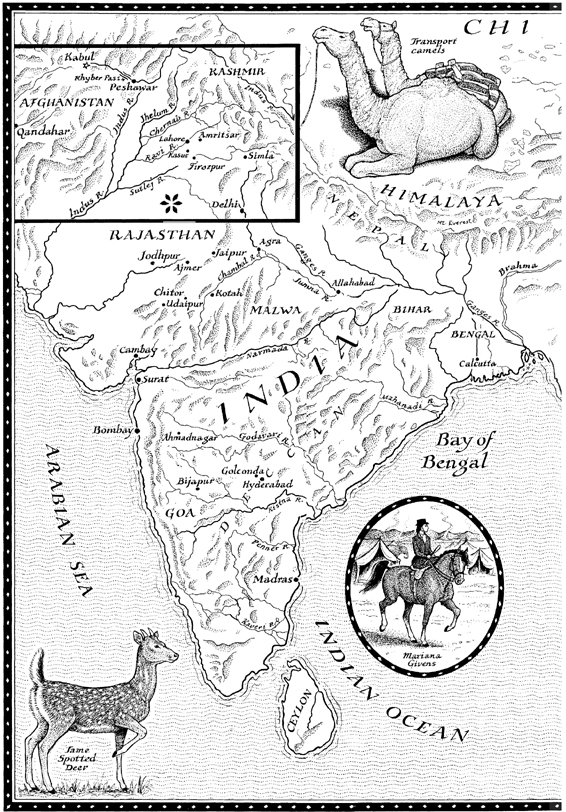
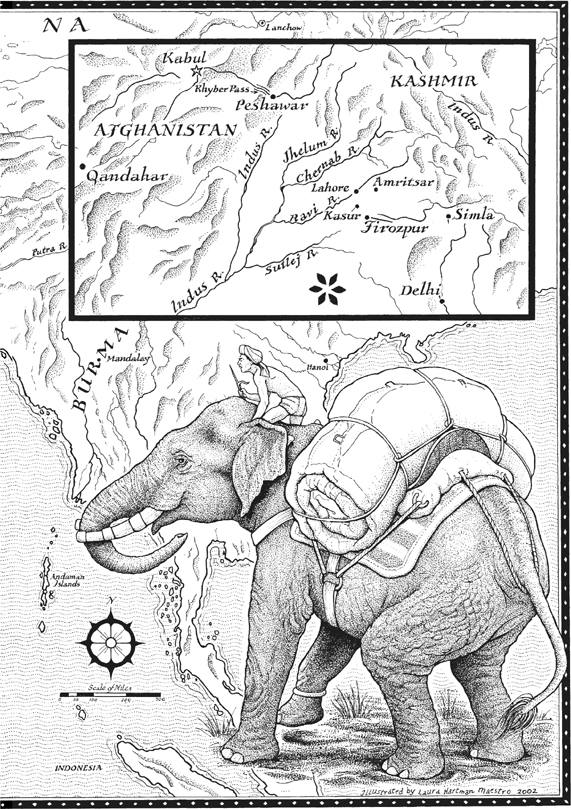
March 21, 1840
N o one knew when the city of Lahore, with its tight, airless lanes and thick, defensive walls, had first arisen beside the Ravi River on the flat plain of the Punjab, but everyone agreed that the city's foundations rested upon the ruins of many older, now forgotten versions of itself, and that the Lahore of the seventeenth century had been the finest and most beautiful of them all.
Two hundred years after the Moghul emperors had embellished it with their elegant architecture, the old city still boasted a grand marble palace within its red brick fort, and a glorious red sandstone mosque. Beyond the city walls, tiled gateways, irrigated gardens, airy pavilions, and the delicately carved and inlaid tombs of the royal dead were witnesses to the grandeur of a city that had once been the northern capital of a great empire.
In the eastern part of the walled city, near the Delhi Gate, stood another architectural masterpiece of the Moghul era, the mosque of Wazir Khan.
Inside the mosque, the morning air was cool, and faintly scented with roses. Sunlight poured in from the courtyard outside, illuminating the dust that hung in clouds, softening the colors of the high-ceilinged prayer chamber. Near a wall densely decorated with Arabic calligraphy, Shaikh Waliullah Khan Karakoyia knelt, shoeless, on a Persian carpet, an illuminated Qur'an open before him on a carved wooden stand, his tall starched headdress lending him a dignity he did not require.
There was no part of the Muslim holy book that Shaikh Waliullah, spiritual guide of the Karakoyia brotherhood of mystics, had not already committed to memory, but even so, he never failed to perform the ceremony of removing the book's silk wrappings and setting it open on a carved stand before chanting the familiar Arabic in his quiet singsong.
Font size:
Interval:
Bookmark:
Similar books «A Beggar at the Gate »
Look at similar books to A Beggar at the Gate . We have selected literature similar in name and meaning in the hope of providing readers with more options to find new, interesting, not yet read works.
Discussion, reviews of the book A Beggar at the Gate and just readers' own opinions. Leave your comments, write what you think about the work, its meaning or the main characters. Specify what exactly you liked and what you didn't like, and why you think so.

